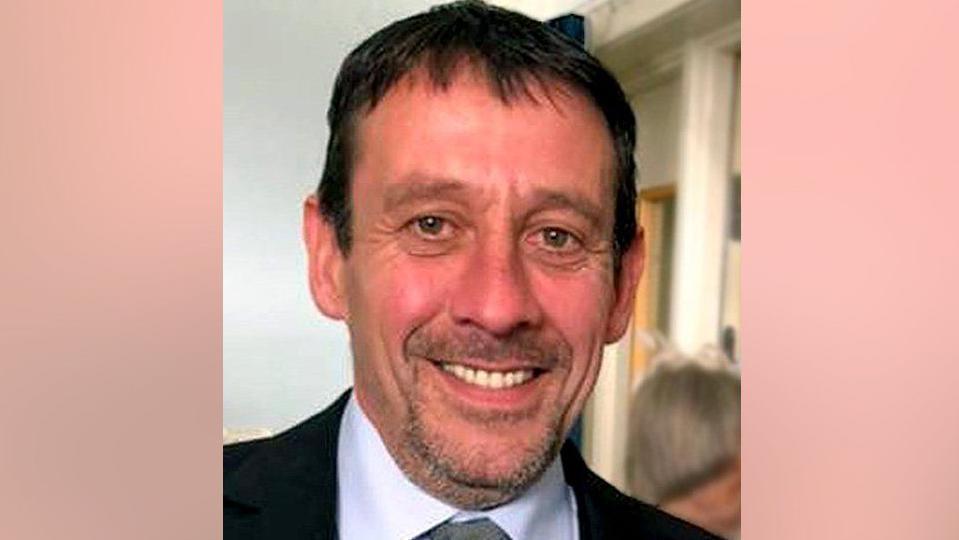Man jailed for murdering brother-in-law in shooting spree
Isle of Skye murder case: How did the attacks unfold?
- Published
A man who carried out a series of shootings in the Scottish Highlands has been jailed for at least 28 years for murdering his brother-in-law and attempting to kill his wife and two other people.
Finlay MacDonald, 41, repeatedly stabbed his wife Rowena at their home on the island of Skye before driving 17 minutes to another village, where he shot and killed his brother-in-law John MacKinnon.
The marine engineer then drove for another 40 minutes before shooting Fay MacKenzie and her husband John in their home on the Scottish mainland.
Despite their injuries, the MacKenzies fought back and wrestled the weapon from MacDonald before he was tackled by police.
Father-of-four MacDonald denied all the charges and claimed he was suffering from an abnormality of mind at the time.
But he was found guilty by a jury at the High Court in Edinburgh, which had deliberated for just over two hours.
MacDonald was jailed for life and ordered to serve at least 28 years before he can apply for parole.
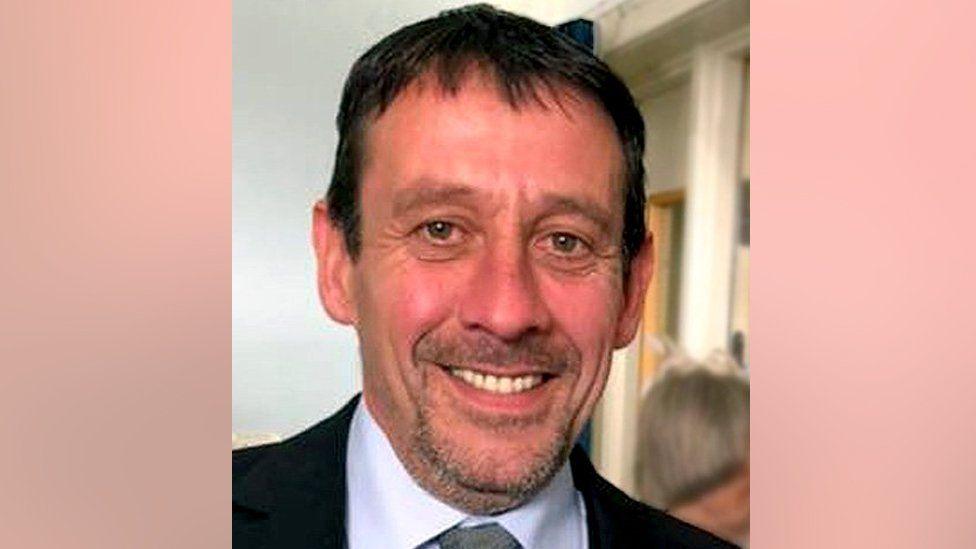
Distillery worker John MacKinnon was shot in the kitchen of his home
Judge Lady Drummond told MacDonald he was guilty of "series of brutal and mindlessly violent attacks", and that statements from Mr MacKinnon's family had been "heartbreaking to read".
The attacks took place over a period of about an hour, starting at before 09:00 on Wednesday 10 August 2022, in the final days of the school summer holidays.
The first incident was in the MacDonalds' family home in Tarskavaig on the Sleat peninsula, an area in the south of Skye which is home to about 750 people.
MacDonald had a volatile relationship with his wife and suspected she was having an affair.
The court heard he was upset by text messages he had seen exchanged between Mrs MacDonald, 34, and her boss.
The couple struggled over her phone, before MacDonald took a knife from his pocket and started stabbing her.
Their four young children heard her screaming and came to the kitchen door. MacDonald continued the attack as his wife tried to get out of the house, but the back door was locked.
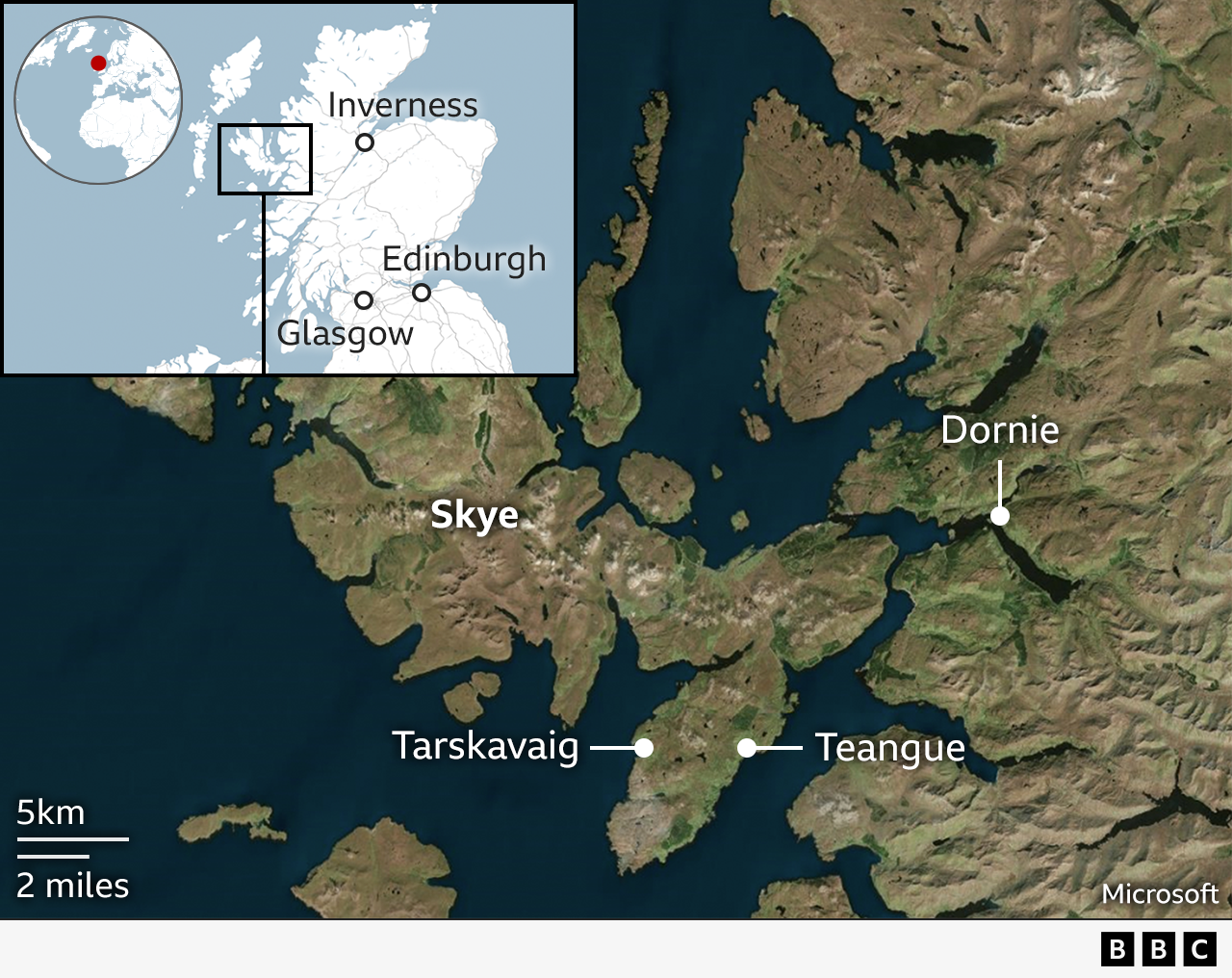
She told the court she remembered getting to her phone to raise the alarm, and that her children were beside her as she became weaker and weaker.
Mrs MacDonald heard her husband making several trips to and from their car before driving off.
He walked past her as she lay bleeding outside trying to call emergency services.
The court later heard that he had "enough ammunition to start a small war".
He then went to his sister Lyn Anne MacKinnon's home in nearby Teangue.
She was outside unpacking a car after a family trip to Glasgow when he pulled up and walked past her carrying a gun.
Within a few steps he was inside the house, where he shot her husband John in the kitchen.
MacDonald passed his sister as he walked back out to his car, but said nothing.
Mrs MacKinnon ran into her home and found her husband standing at the kitchen sink.
The 47-year-old distillery worker collapsed into her arms and died despite the efforts of emergency services.
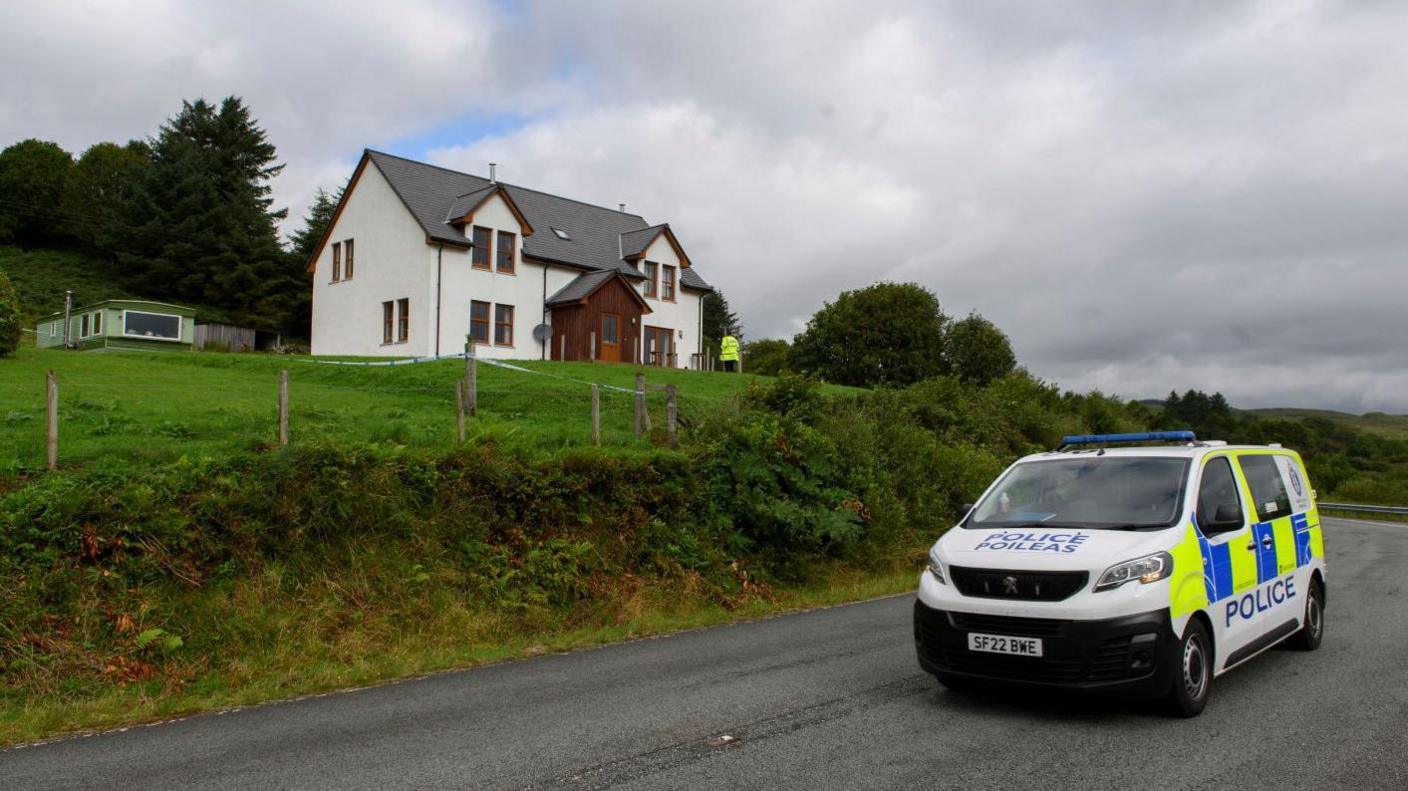
Police at the MacKinnons' home in 2022
MacDonald, meanwhile, was headed for Dornie.
Police responding to the 999 call about the attack on Rowena MacDonald spotted his Subaru and followed him to the village, near Eilean Donan Castle in Wester Ross.
Officers were advised not to stop MacDonald and were told that armed officers were also responding to the incident.
He was heading for the home of John MacKenzie - a retired osteopath who MacDonald blamed for making a back injury worse.
When he arrived he shot 65-year-old Fay MacKenzie through a window of the house.
Mr MacKenzie, who had been outside feeding pigs, arrived home and quickly became aware something was wrong.
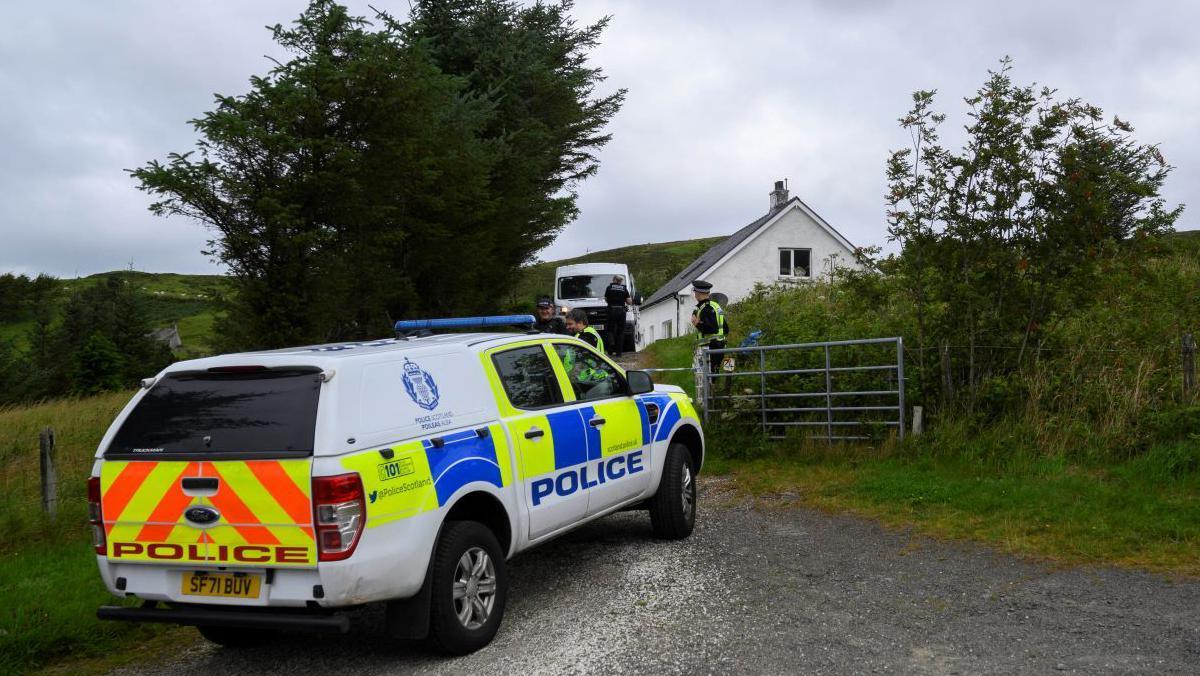
The series of attacks began in Tarskavaig on the morning of 10 August 2022
The 65-year-old was shot in the back while trying to protect his wife as they sought safety in a bathroom.
The couple then tackled MacDonald. Mr MacKenzie wrestled the gun from him and Mrs MacKenzie hit their attacker with a "hefty" metal toilet roll holder.
She struck MacDonald at least twice before hearing a voice say: "That will do."
It was then she noticed police were in the house.
One officer used a spray similar to a pepper spray on MacDonald but it did not seem to have an effect. Another officer then struck him with a baton while his colleague used a Taser.
MacDonald's attacks were carried out with a pump action shotgun he bought for £625.
He had held a firearms licence for 15 months and told police he owned six guns.
The court heard that at the time of the attacks, Mr MacDonald was affected by autism and post traumatic stress disorder with depression, anxiety and a personality disorder in the background.
He told a consultant forensic psychiatrist that he had difficulties dealing with people and situations and he saw himself as a victim.
MacDonald alleged he was previously beaten up in a fight with Mr MacKinnon, and said the incident had left him feeling humiliated.
Watch sentencing of Finlay MacDonald for 'brutal and mindlessly violent attacks'
Lady Drummond said Mr MacKinnon's relatives felt like they had lost the life and soul of the family.
The judge said he had been a loving husband, brother and a wonderful father.
She said: "The last two years have been unimaginably difficult for them all.
"They miss and grieve him daily."
She said that although jurors rejected a claim of diminished responsibility, MacDonald's health issues were still a matter to be taken into account and she acknowledged that he had expressed remorse.
Lady Drummond also said the jury had rejected a claim that he was provoked into attacking his wife "by reason of sexual infidelity".
She told MacDonald the scars he left his wife with were a "permanent reminder" of that day.
Watch footage of police chase during Skye attacks
The judge said the MacKenzies had also been left with permanent injuries. Mr MacKenzie had 100 pieces of gunshot removed from his bowel.
In a statement read outside the court, Mr MacKinnons' family thanked the prosecution and jury for securing justice.
They said he had left an "incredible legacy" for his six children, who had been "left without his love, support, guidance and humour".
They also thanked the arresting officers for their "incredible bravery".
Det Supt Lorna Ferguson said the officers had followed MacDonald's vehicle and put themselves "at extreme risk" by pursuing him into a house while shots were being fired.
"Their actions, which put public safety before their own, brought this incident to an end without further loss of life," she said.
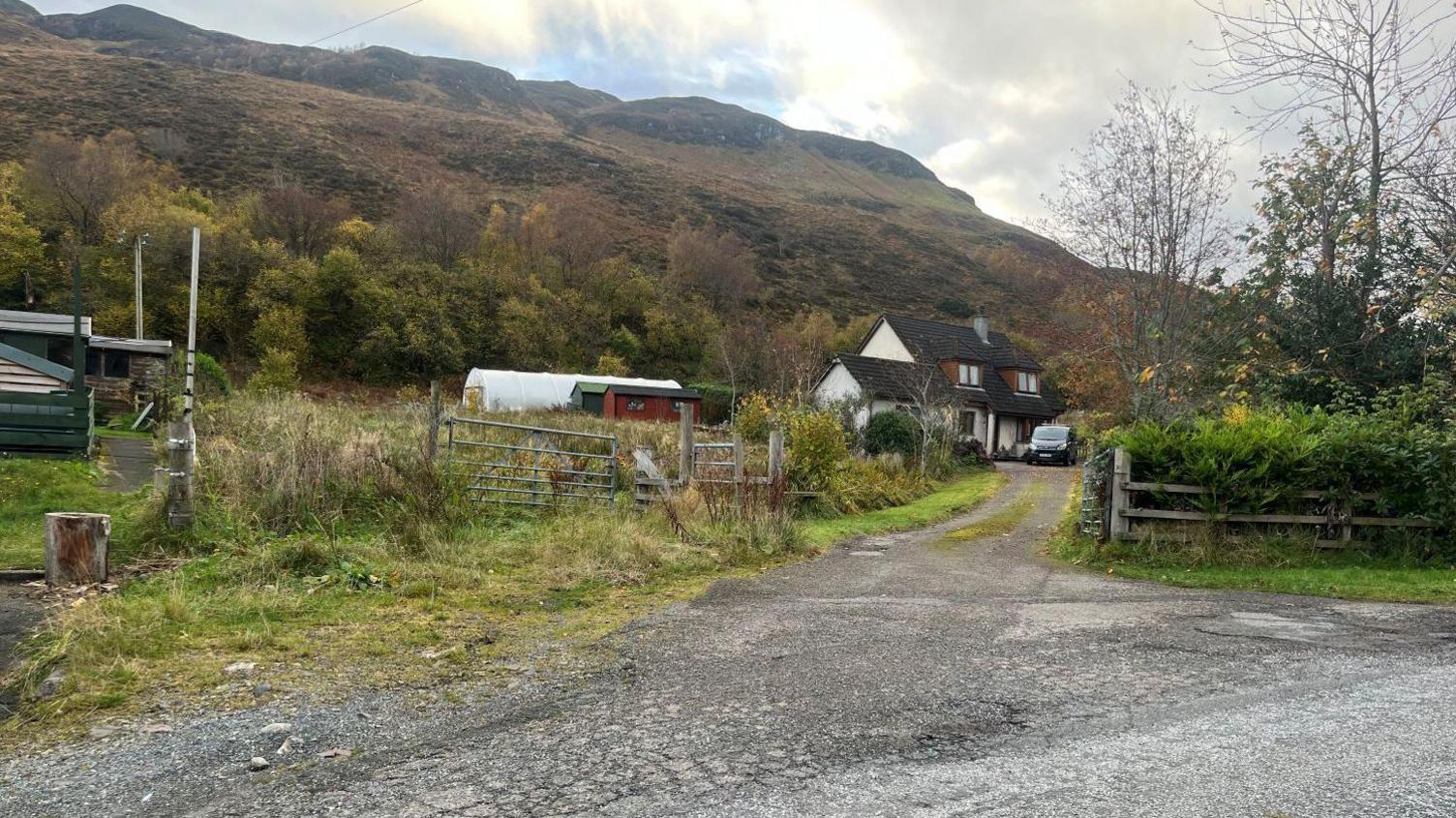
The incidents came to an end in the MacKenzies' home in Dornie
The attacks sent shockwaves through the west Highlands, where incidents of extreme violence are rare.
The Reverend Gordon Matheson, who was a local Free Church pastor, had known MacDonald because their children were about the same age.
"I got to know him on the school run and at football training," he said.
"Across the community there's a feeling of betrayal - this is one of ours who killed another one of ours."
Skye and Raasay councillor John Finlayson said: "I don't think we should underestimate the impact it had on so many people.
"Not just those directly affected by the incident, but also the wider community.
"The communities affected probably still bear the scars and the healing process is still ongoing."
He added: "I am sure people will continually need support.
"There is closure for some, but for some people that might never happen."
Additional reporting by Steven Godden, Alasdair Macleod, Morgan Spence, Chris MacLennan, Iain Macinnes and Edinburgh Courts Press Services.
Related topics
- Published18 November 2024
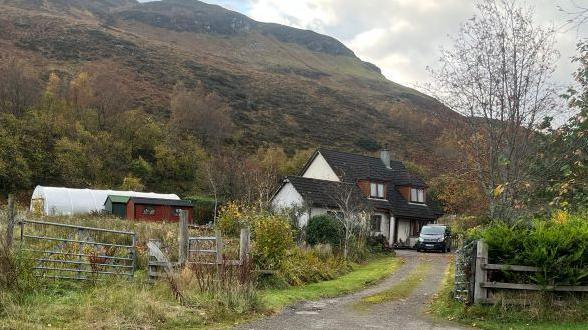
- Published14 November 2024
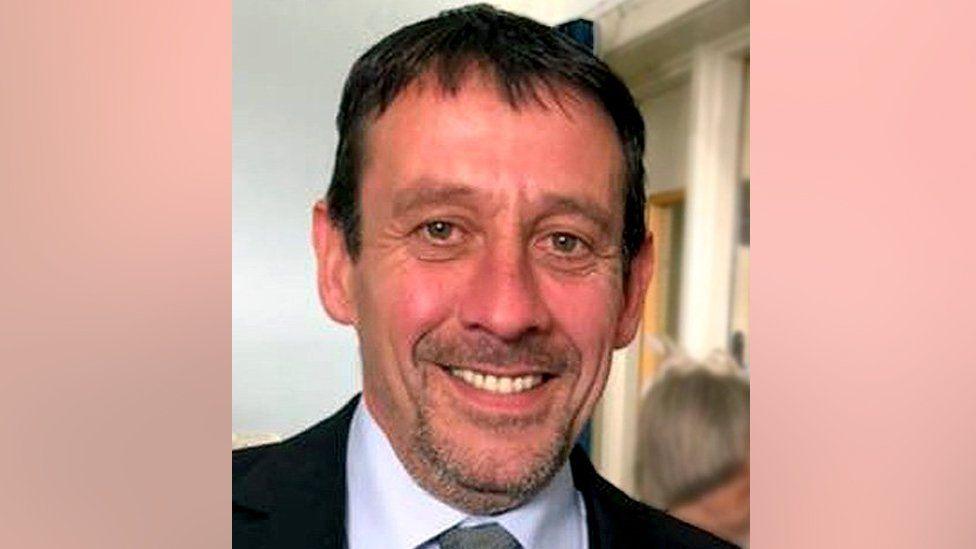
- Published13 November 2024
